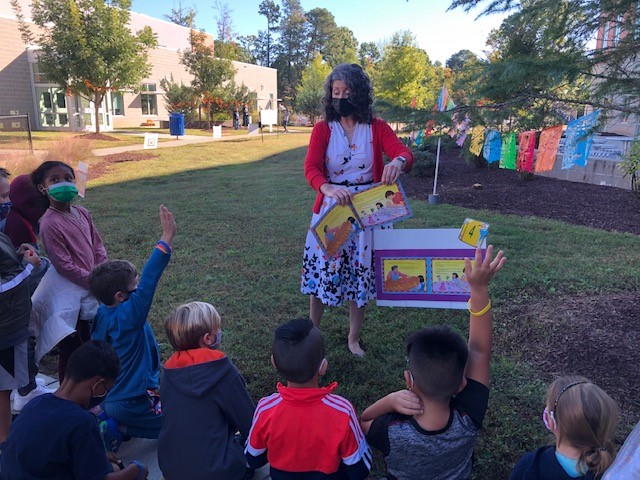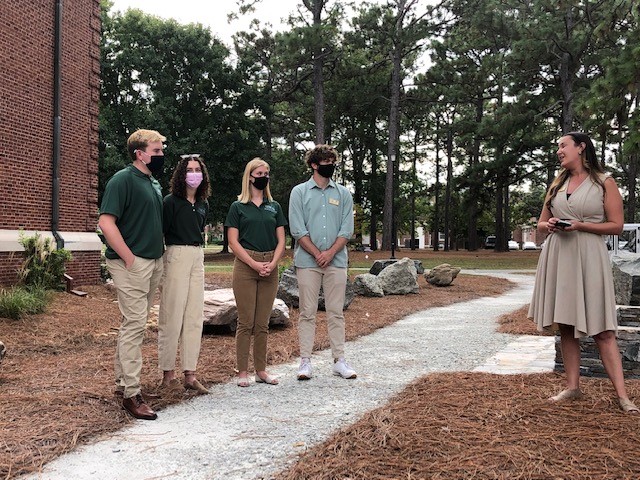
by North Carolina Department of Public Instruction
The North Carolina Department of Public Instruction (NCDPI) welcomed U.S. Department of Education (ED) leadership including Deputy Secretary Cindy Marten, Senior Advisor to the Deputy Secretary Staci Monreal, and U.S. Department of Education Green Ribbon Schools (ED-GRS) Director Andrea Suarez Falken, to Raleigh on Oct. 19, as part of ED’s annual Green Strides Tour. The three-day visit in the Tar Heel state honored past and present recipients of the ED-GRS recognition award. These schools, districts, and postsecondary institutions have received recognition for their progress in the three Pillars of ED-GRS. They each demonstrate efforts in all three of the following areas: 1) reducing environmental impact and costs; improving health and wellness; and ensuring effective environmental and sustainability education.
NCDPI and ED kicked off the tour by visiting 2019 ED-GRS Abbotts Creek Elementary School. Visitors learned about the parent-led Abbotts Creek compost program. We also saw the garden, learned about citizen science projects involving the environment, observed a rescue turtle effort in collaboration with NC State University, and heard about nature explorer backpacks and science notebooks to facilitate environmental learning.

Turning the focus to Wake County Public Schools System (WCPSS) more broadly, which received the 2021 District Sustainability Award, the tour continued with Athens Drive High School where guests visited an outdoor classroom, animal and agricultural science programs, and a global health academy aligned to the UN Sustainable Development goals.
We also had the opportunity to learn about the two environmental connections magnet elementary schools in WCPSS, both of which earned the school award in 2020. Lincoln Heights Environmental Connections Magnet Elementary School in Fuquay-Varina, completed a building renovation which helped reduce domestic water use by 61 percent and energy use by 29 percent. The entire staff completed environmental and problem-based learning professional development. Expeditions are 30-minute clubs at the end of each day to allow students to further investigate environmental topics.

At Millbrook Environmental Connections Magnet Elementary, in Raleigh, students attend Environmental Inquiry classes two times a week. In 2019, rain, pollinator, and edible gardens were installed on campus as part of an outdoor learning lab. Millbrook Environmental partners with the Raleigh InterFaith Food Shuttle to use the garden space in the most efficient and integrative way possible. Food Corps volunteers are on-site two days per week, co-teaching garden curriculum, maintaining garden space with students, and monitoring the cafeteria and composting.
The day wrapped with a visit to Exploris Charter School, a 2014 ED-GRS award winner, where students shared about their experiential projects that allow for engagement with the local community and natural areas. The Exploris School uses an interdisciplinary, project-based curriculum. In alignment with the school’s core values, the bulk of each grade-level’s work centers on issues of environmental sustainability and STEM pathways.

The Green Strides tour continued Wednesday in the Sandhills region, where we visited three ED-GRS award winners in Hoke and Cumberland counties. Kicking the day off at Hoke County’s Sandy Grove Middle School, visitors learned some of the benefits of a newer school construction. This LEED Gold school, featuring abundant solar and geothermal energy, is net positive, producing 40-60% more energy than it consumes, and selling it back to the local energy company. We saw how students use the building’s features as a learning tool to understand new technologies and prepare for the careers of the future. The building, financed through a unique local partnership, also earns top marks in healthy indoor environments, encompassing aspects such as daylighting, moisture control, thermal comfort, air quality, and contaminant controls, to name a few.

We then visited Douglas Byrd High School to learn about its Academy of Green Technology (AoGT). Students enrolled in the AoGT take part in outreach programs to educate the underserved surrounding community about solar, gardening, and environmental stewardship. The academy provides students with hands-on learning opportunities through classes focused on sustainability and clean energy. These courses allow them to graduate with the credentials needed to excel in the workforce whether they choose to be engineers, landscapers, architects, or electricians. We saw their greenhouse, model solar home, and drone learning in action.
Wednesday’s visit concluded at Walker-Spivey Elementary School, where a team of committed teachers, students, and community partners have built a special learning garden. They planted kale and harvested sweet potatoes before our eyes. Walker-Spivey is, in many ways, like the vast majority of green schools work across the country – older constructions where the community gets serious about tracking and conserving energy and water, installing low-cost retrofits like efficient bulbs and faucets, building gardens, encouraging active transportation, and setting up recycling programs.

The Green Strides Tour wrapped up Thursday in Wilmington, North Carolina, highlighting a close-knit community that worked together for three separate ED-GRS application efforts this year with support from the local university. The first stop of the day was Wrightsville Beach Elementary School, where students showcased their marine science program. This program has grown over the course of 20 years to encompass outdoor marine science and environmental education using a dock that extends into the nearby sound. Each week, students have class on the school dock to learn about the marsh ecosystem and local wildlife. Students collect and record data on water quality, tide levels, and the number of fish and crabs caught during each class for cross-curricular lessons.

The next stop was D.C. Virgo Preparatory Academy. This was one of a handful of once-struggling schools made into lab schools by statute in North Carolina. This brought DC Virgo under the wing of the University of North Carolina Wilmington College of Education. The school now features interdisciplinary STEM education, marine science, mycology labs, an action-based learning lab, restorative justice circles, and learning gardens. Students have conducted waste, water, and energy use audits for their school.
The Green Strides Tour culminated with a visit to the UNC Wilmington – one of only two universities in North Carolina to be named an ED-GRS Postsecondary Sustainability Awardee. Visitors enjoyed lunch with the UNCW sustainability community in a certified green dining facility, visited the health and human sciences and education programs, and learned about how DeLoach Geological Rock Garden is offering both learning opportunities and stormwater best management practices. The postsecondary honoree also stood out for its Sustainability Minor, Sustainability Learning Community, student supported Green Initiative Fund, and Sustainability Peer Educators.

Since the ED-GRS recognition was first awarded in 2012, North Carolina honorees have numbered 15 schools, three districts, and two postsecondary institutions. NCDPI was thrilled to have the opportunity to show off the talent, innovation, and ingenuity underway at schools across North Carolina over the course of the three day-tour.
Thanks to the trailblazers we visited during the #GreenStridesTour, other schools can learn about reducing environmental impacts, improving health, and teaching effective environmental education. As we look back on our tour experiences last week, we all return home feeling confident that the Tar Heels state will produce many more ED-GRS awardees in the years to come.

